The Bioethics and Law Obs.
Master in Bioethics and Law
UNESCO Chair in Bioethics
Contact
- Bioethics and Law Observatory
- UNESCO Chair in Bioethics
- University of Barcelona
- Faculty of Law
- Ave. Diagonal, 684
- 08034 Barcelona
- (+34) 93 403 45 46
- obd.ub@ub.edu
- Master in Bioethics and Law
- (+34) 93 403 45 46
- master.bd@ub.edu
RSS del Observatori de Bioètica i Dret UB
-
Artículo "¿Pechos o viaje de fin de curso?", por María Casado
Columna escrita por María Casado y publicada en El Periódico el día 16 de agosto de 2002. La Dra. María Casado es directora del Observatorio de Bioética y Derecho (OBD) y del Máster en Bioética y Derecho, así como titular de la Cátedra UNESCO de Bioética de la Universidad de Barcelona.
Hay adolescentes que piden que se les premie con una operación de estética. Algunas clínicas deben asumir su parte de responsabilidad en ello.
Cada verano, el final de curso plantea un nuevo dilema a un número creciente de personas: ¿qué premio otorgar por las buenas notas? Antes, los chicos bien pedían a sus padres un viaje; ahora, cada vez son más los que solicitan una operación de estética. Aunque todavía se trate de un fenómeno minoritario, ligado a los sectores que poseen un desahogado nivel económico, plantea algo que merece una cierta reflexión.
¿Qué está pasando para que los jóvenes se muestren tan a disgusto con sus propios cuerpos y que ya a los 16 o 17 años quieran operarse para cambiar su imagen? ¿Es la forma de aumentar la autoestima?
La adolescencia es una etapa de crisis y de aprendizaje que a veces genera inseguridad también respecto de la propia imagen. Pero ¿cómo es posible que para superar esta fase de la maduración personal promovamos los sustitutivos en vez de enseñar a estar a gusto consigo mismo? Si se recurre a adaptar el propio cuerpo a la moda, que por definición es pasajera, ¿qué pasara cuando cambie el canon estético?, ¿de nuevo al quirófano?
OPERARSE NO es como comprar una camiseta que se elige y cuando ya no gusta se tira: el cuerpo es para toda la vida y tales intervenciones tienen, necesariamente, implicaciones en la salud. La cirugía estética no es un bien de consumo como se podría deducir de lo que está ocurriendo. Se trata de un acto médico, y como tal debemos tratarlo.
El código deontológico de los médicos, vinculante para todos ellos, establece textualmente en su artículo 101: "El médico no tiene que fomentar engañosas esperanzas de curación ni tampoco promoverá falsas necesidades relacionadas con la salud. También deberá abstenerse de emplear medios y/o mensajes publicitarios que menosprecien la dignidad de la profesión o tengan afán de lucro".
Y el artículo 102 dice: "El médico podrá comunicar a la prensa y a otros medios de difusión, no dirigidos por médicos, información sobre sus actividades profesionales, siempre que ésta sea verídica, mesurada, discreta, prudente y comprensible".
La publicidad que realizan ciertas clínicas en todos los medios de comunicación vulnera estos dos artículos, por lo que la corporación, si desea seguir contando con el respeto de los ciudadanos, debe ser exigente en el cumplimiento de las limitaciones que su propio código contempla. Determinada publicidad fomenta, desde luego, esperanzas engañosas; y, lo que es peor, sin ser mesurada ni prudente, promueve falsas necesidades con coartada sanitaria.
Esta medicina electiva ―y selectiva― fomenta, además, una nueva discriminación, puesto que la sanidad pública sólo cubre los tratamientos estéticos que se justifican por razones de salud; querer ser una barbie está fuera de la cobertura sanitaria.
Tenemos, generalmente, la idea de que los clientes de los cirujanos de estética han sido mujeres maduras que deseaban detener el paso del tiempo y ―también en una época de crisis personal― acudían a este tipo de ayuda y camuflaje. Pero ahora se crean necesidades ―mediante técnicas publicitarias clásicas, que generan la demanda― en jóvenes vulnerables que pueden adoptar decisiones sin vuelta atrás y cuyas consecuencias tendrán, literalmente, sobre sí a lo largo de toda su recién comenzada vida.
A PESAR DE que los cirujanos plásticos tratan de definir su actividad como destinada a conseguir "una mejor calidad de vida y el bienestar físico y psíquico que han de configurar un estado de salud óptimo", curiosamente, la estética genera abundantes demandas contra los médicos.
Tantas como para que el propio Colegio de Médicos se haya planteado la necesidad de aumentar la cobertura económica de su póliza de responsabilidad profesional. Es necesario recordar que, siendo la medicina una profesión que no está obligada a proporcionar resultados, sino sólo a actuar "según las reglas de la lex artis", en el caso de la cirugía estética sí que existe una obligación de suministrar resultados, como ya han reiterado los tribunales.
La ambivalencia entre la mera estética y la terapia es algo con lo que se está jugando de forma que, en nombre de la salud, se legitiman prácticas que, en muchos casos, son simple consumo vestido de necesidad sanitaria.
-
An exhibit on 'Law and Science: Smaller than smaller, nanotechnology on debate'
The exhibit “Law and Science: Smaller than smaller, nanotechnoly on debate” has been inaugurated this month at the entrance hall of University of Barcelona School of Law (UB). The exhibit, organised by the Barcelona Science Park Scientific in collaboration with the OBD and the IBEC will be open to visitors until the 4th of June, and it is aimed at providing information and fostering public debate on nanotechnology and its applications in routine daily life.
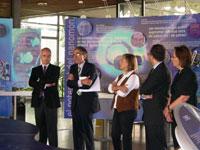 EThe exhibit “Law and Science: Smaller than smaller, nanotechnoly on debate” has been inaugurated on 4th of May, at the entrance hall of University of Barcelona School of Law (UB). The exhibit, organised by the Barcelona Science Park Scientific Diffusion Department, in collaboration with the Observatory of Bioethics and Law, the UNESCO Chair of Bioethics at the UB, and the Institute of Bioengineering of Catalonia, based at PCB, will be open to visitors until the 4th of June, and it is aimed at providing information and fostering public debate on nanotechnology and its applications in routine daily life.
EThe exhibit “Law and Science: Smaller than smaller, nanotechnoly on debate” has been inaugurated on 4th of May, at the entrance hall of University of Barcelona School of Law (UB). The exhibit, organised by the Barcelona Science Park Scientific Diffusion Department, in collaboration with the Observatory of Bioethics and Law, the UNESCO Chair of Bioethics at the UB, and the Institute of Bioengineering of Catalonia, based at PCB, will be open to visitors until the 4th of June, and it is aimed at providing information and fostering public debate on nanotechnology and its applications in routine daily life.The event was inaugurated by the dean of the Law School, Enoch Alberti; the director of the Observatory of Bioethics and Law and the UNESCO Bioethics Chair at the UB, Maria Casado; the director general of the Barcelona Science Park (PCB), Fernando Albericio; and by the head of the Nanobioengineering Laboratory, Josep Samitier, from the Institute of Bioengineering of Catalonia (IBEC), based at PCB.
The initiative is framed within the context of the Nanodialogue European project that the EU started as part of the 6th Framework Programme to give some thought to the scientific-technical, ethical, social, economic, political and legal aspects arising from advances made in the field of nanotechnology sciences and to facilitate the transfer of this vast knowledge to society.
This itinerant exhibit, which has already been shown in Barcelona at the Faculty of Physics and Chemistry and at the Cloister of the Institute of Catalan Studies and has been visited by more than one million people from different countries, features scientific information displays and different assessments from miscellaneous fields. It also provides the necessary tools for visitors to express their views and opinions.
The Observatory of Bioethics and Law is currently engaged in a research project known as Nanobiolaw, promoted by the Ministry of Science and Innovation and aimed at facilitating dialogue and contributing towards the improvement of relations among the expert disciplines involved ― science, ethics, and law, ― and the interests of the community, so that advances and applications made in biotechnology are developed under safety and responsibility principles. Because of this, and besides collaborating in the execution of the sample, it has readapted part of its contents in order to make the legal information in that regard known to the public.
The debate themes included in the exhibit include: risk and benefit assessment that the use of nanotechnologies entails, the currently existing breach between rich and poor countries with regard to investment in this field, the legal framework governing the production and commercialisation of these products and the policies that should be established or that are being applied in research and the investments in this new era of science.
Come to see the exhibit!
-
EXPONANO "Smaller than small: debating nanotechnology". Barcelona
 «EXPONANO. “Smaller than small: debating nanotechnology” forms part of a European project , Nanodialogue, which aims to provide information and encourage debate about nanotechnology and its consequences for our everyday lives.
«EXPONANO. “Smaller than small: debating nanotechnology” forms part of a European project , Nanodialogue, which aims to provide information and encourage debate about nanotechnology and its consequences for our everyday lives.- What are nanotechnologies and what can they do for us?
- How will they change our lives over the next twenty years?
- Are we facing a technological revolution or is it the evolution of current technology?
We organize guided visits to the exhibition. They include taking part in a game developed as part of the European project DECIDE , which is designed to stimulate debate.
-
The OBD launches a Document focused on the ethical, legal and policy issues concerning food information
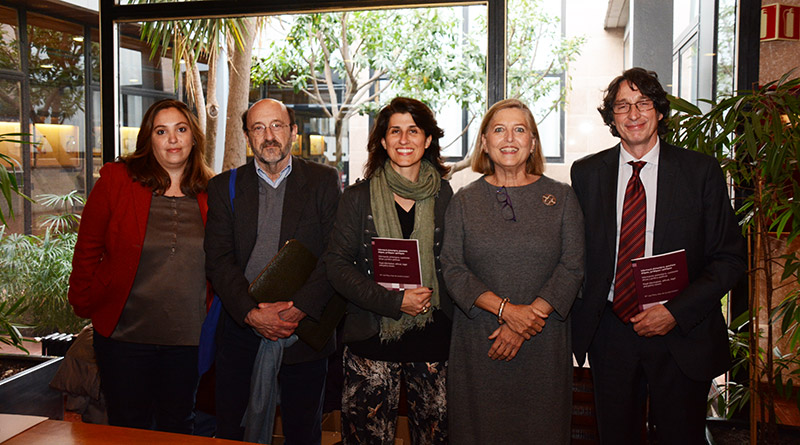 On Monday 27th of March was launched in the Law School of the University of Barcelona the Document Food information: ethical, legal and policy issues elaborated by the Opinion Group of the Bioethics and Law Observatory of the University of Barcelona. It has been coordinated by Maria José Plana, lawyer and director of the Master in Food, Ethics and Law, and Itziar de Lecuona, professor, deputy director of the Bioethics and Law Observatory and member of the University of Barcelona's Bioethics Commission.
On Monday 27th of March was launched in the Law School of the University of Barcelona the Document Food information: ethical, legal and policy issues elaborated by the Opinion Group of the Bioethics and Law Observatory of the University of Barcelona. It has been coordinated by Maria José Plana, lawyer and director of the Master in Food, Ethics and Law, and Itziar de Lecuona, professor, deputy director of the Bioethics and Law Observatory and member of the University of Barcelona's Bioethics Commission.The presentation of the Document has been chaired by María Casado, director of the OBD, the Master in Bioethics and Law and director of the UNESCO Chair in Bioethics at the University of Barcelona and has included the contributions of the coordinators of the Document, Jordi Portabella, director of the Department of Research and Knowledge of Fundación Bancaria la Caixa, and the researcher Pere Puigdomenèch, member of CSIC and the European Group of Ethics in Science and New Technologies and one of the signers of the text.
This Document is launched in a key moment. It shows how the regulation of advertising and labelling works and exposes the differences between the legal definitions and socially recognized meanings of key concepts in the labelling of foods, such as “organic”, “light” or “natural”.
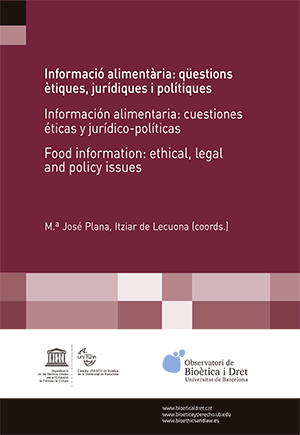 Consumer calls for an informative labelling of food products. María José Plana, has highlighted that we have made great progress regarding food information. We have more information regarding food safety and food frauds but nowadays consumers also aim at knowing in which conditions the product has been produced and which are the environmental effects of its elaboration.
Consumer calls for an informative labelling of food products. María José Plana, has highlighted that we have made great progress regarding food information. We have more information regarding food safety and food frauds but nowadays consumers also aim at knowing in which conditions the product has been produced and which are the environmental effects of its elaboration.Thus, this Document is launched in a key moment. It shows how the regulation of advertising and labelling works and exposes the differences between the legal definitions and socially recognized meanings of key concepts in the labelling of foods, such as “organic”, “light” or “natural”. Moreover, it highlights the importance of establishing quality criteria concerning the food information that consumers can fine on the internet. Due to the fact that sometimes it is difficult to set a line between a rigorous dietary recommendation and a product advertisement. The Document also highlights the role of public authorities as guardians of the system and food frauds detectors.
Consumers have more information regarding food safety and food frauds but nowadays consumers also aim at knowing in which conditions the product has been produced and which are the environmental effects of its elaboration.
Through the analyses and the interdisciplinary research of food information, the Document ends with a set of recommendations addressed to public authorities, industry and research and innovation centers, media and content providers and citizens. The recommendations aim at creating an impact to stakeholders, especially, fostering an informed and engaged consumer.
Finally, Dr. Pere Puigdomènech has closed the event highlighting three main points: Food is a right, it has to be safe and we have to work together in order to tackle that future generations can reach the same degree of food that we have assimilated.
-
Presentation of the OBD Document "Food information: ethical, legal and policy issues". Barcelona
 On the 27th march 2017, at 6:30p.m., will take place the academic presentation of the new Document of the Bioethics & Law Observatory (OBD) on "Food information: ethical, legal and policy issues", coordinated by Dr. Itziar de Lecuona and the Food Lawyer María José Plana, heads of the research line on "Bioethics, Food and Law" and directors of the OBD’s Master in Food Ethics & Law.
On the 27th march 2017, at 6:30p.m., will take place the academic presentation of the new Document of the Bioethics & Law Observatory (OBD) on "Food information: ethical, legal and policy issues", coordinated by Dr. Itziar de Lecuona and the Food Lawyer María José Plana, heads of the research line on "Bioethics, Food and Law" and directors of the OBD’s Master in Food Ethics & Law.This event will be held at the “Salón de Grados” of the University of Barcelona (UB)’s Faculty of Law. The presentation will be led by Dr. María Casado, director of the OBD and of the Master in Bioethics and Law, and UNESCO Chair of Bioethics, together with the coordinators of the Document and Jordi Portabella, Director of the Research and Knowledge Department of the Fundación Bancaria "la Caixa", that sponsors this work.
Dr. Pere Puigdomènech, CSIC’s research professor and member of the European Group of Ethics in Science and New Technologies will also participate in this presentation.
This Document will be made available in open access and in 3 languages (catalan, spanish and english) on the 27th march at 6 p.m. through this link: www.bioethicsandlaw.es/documents. Copies of the Document will also be distributed at this event.
- Date: 27th March 2017, 6:30 p.m.
- Location: Salón de Grados, Faculty of Law of the University of Barcelona (Ave. Diagonal, 684, Barcelona).
- Registration: attendance is free of charge, but seating is limited.
Photos
-
The OBD releases a new series of documents on the ethical, legal and social implications of the current food system
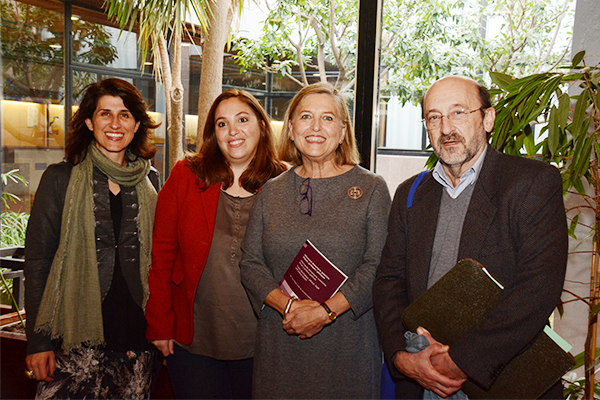 The Bioethics and Law Observatory (OBD) of the University of Barcelona is releasing a series of documents –together with of “la Caixa” Banking Foundation- on the ethical, legal and social implications of the current nutrition system. The first opinion document was presented today Monday March 28, at 18.30h, at the Faculty of Law of the University of Barcelona, and wants to highlight “the disconnection between the current policies on nutrition based on its tag and the indiscriminate diffusion of food information the consumer has”. Also, it wants to show “the consequences this situation can have on individual food choices, public health and the perpetuation of productive practises and patterns of environmental and socially unsustainable uses”.
The Bioethics and Law Observatory (OBD) of the University of Barcelona is releasing a series of documents –together with of “la Caixa” Banking Foundation- on the ethical, legal and social implications of the current nutrition system. The first opinion document was presented today Monday March 28, at 18.30h, at the Faculty of Law of the University of Barcelona, and wants to highlight “the disconnection between the current policies on nutrition based on its tag and the indiscriminate diffusion of food information the consumer has”. Also, it wants to show “the consequences this situation can have on individual food choices, public health and the perpetuation of productive practises and patterns of environmental and socially unsustainable uses”.The text, entitled Food information: ethical, legal and policy issues is coordinated by the directors of the Master degree in Food, Ethics and Law of the UB, M. José Plana and Itziar de Lecuona. The creation of the document counted with the participation of several experts of the opinion group led by María Casado, director of the OBD.
The presentation of the document counted with the participation of the mentioned coordinators and María Casado. Also, other participants were Jordi Portabella, director of the Department of Research and Knowledge of Fundación Bancaria la Caixa, and the researcher Pere Puigdomenèch, member of CSIC and the European Group of Ethics in Science and New Technologies and one of the signers of the text.
The aim of this document is to “influence public policies and social debate on bioethical challenges presented by the current food system and its evolution; focusing on the role of innovation and information technologies on security, quality and effective sustainability of the system, and putting emphasis on communication and people’s risk perception”.
“The aim of Obra Social “la Caixa” is to contribute in the construction of a fair society. In this context, nutrition, as one of the basic functions of life, needs a more precise and understandable information for everyone”, said Jordi Portabella.Proposals for a responsible transfer of information
 The document states that, if tags have an essential role on consumer’s protection, it is necessary to go through the public policies on food information: “It is necessary to improve legislation and act convincingly to get rid of advertising campaigns that, despite fulfilling the law, mislead consumers when it comes to food’s information”, said the coordinators.
The document states that, if tags have an essential role on consumer’s protection, it is necessary to go through the public policies on food information: “It is necessary to improve legislation and act convincingly to get rid of advertising campaigns that, despite fulfilling the law, mislead consumers when it comes to food’s information”, said the coordinators.The authors suggest setting up initiatives so that citizens can be aware of the the social and environmental costs caused by certain food products, for example, on animal health as well as the environmental impact coming from the uses of certain materials or techniques in the food chain.
The document puts special emphasis on online communication. The authors believe it is important to promote good practices among those who share information (bloggers, digital gateways, food-content apps) “to improve the commitment with quality and security”. At the moment, these suppliers do not have systems to give explanations to readers. In addition, the document complains about not having transparency regarding the used resources or advertising interests from content suppliers.
Moreover, and “facing the overwhelming dose of information on researches that are apparently scientific, with a reliability and quality hard to verify”, the document calls for a protection of the independence of health professionals, who are the source of information on which people rely the most in these subjects. To do so it suggests setting up protocols that –like it happens in the pharmaceutical industry- can stop promotional initiatives for these professionals.
OBD opinion group
The OBD Opinion Group, that created this document, was created in 1996 under the supervision of María Casado. This group aims to have an influence on the dialogue between the university and society through scientific and technological knowledge transfer and the necessary reasons to take part in an information social debate. The publication of this document reaches the twenty-five texts that already make a collection, published by Editions and Publications of the UB, covering current affairs on which there is not an unanimous opinion among society or different involved scientific communities. This required identifying problems, contrasting explanations and suggesting consensus recommendations.
-
Food information: ethical, legal and policy issues
- Document [PDF]
- Press release - 03/29/2017
- Press release - 03/27/2017
- Presentation event - 03/27/2017
- To link or cite this document: http://hdl.handle.net/2445/109511
-
Artículo "Hechos, valores y normas", por María Casado
Columna escrita por María Casado y publicada en El Periódico el día 16 de agosto de 2002. La Dra. María Casado es directora del Observatorio de Bioética y Derecho (OBD) y del Máster en Bioética y Derecho, así como titular de la Cátedra UNESCO de Bioética de la Universidad de Barcelona.
Las leyes no están para hacernos santos, sino para aumentar el bienestar y permitir el ejercicio de la libertad. Pero cuando se trata de la protección de la adolescencia, perdemos de vista este principio.
La vida del Derecho surge de la interacción dinámica entre tres elementos ―hechos, valores y normas― y la vida armónica de la comunidad depende de la apropiada relación entre ellos. Si el poder político quiere organizar la convivencia, debe tener presente que estas tres esferas se desenvuelven en ritmos distintos y que sus tempos no siempre resultan acompasados.
Cuando en la sociedad surge un conflicto, el Derecho dicta una norma para regularlo, tratando de minimizarlo (ojalá lo resolviese). Analizar cualquier ley permite constatar cómo trata de conferir determinado sentido a unos hechos, es decir, conseguir la realización de determinados valores y fines. Determinar cuáles sean éstos es una opción que en las sociedades democráticas se establece por el consenso de los grupos, manifestado arquetípicamente en la composición del arco parlamentario.
No es claro que exista un único y verdadero fin para las normas jurídicas, ni que deban ser la imposición coactiva de una moral pretendidamente común, pero sí que hay acuerdo en que deben orientarse al bienestar general y a la protección de los más débiles. Las normas jurídicas tienen como función hacer posible la vida en sociedad y para ello es preciso elegir entre las diversas opciones e intereses, priorizando la protección que se otorga a los diferentes bienes en conflicto.
Un ejemplo ilustrará la cuestión: el incremento del aborto adolescente ―que se refleja en recientes estadísticas―, y la propuesta para la instalación de máquinas expendedoras de preservativos en los centros de enseñanza ―llevada a cargo en la última campaña antisida―, han generado en los diversos sectores sociales reacciones encontradas. Ante unos hechos como el aumento de los embarazos no deseados, seguidos de abortos y la constatación de que las relaciones sexuales no protegidas constituyen una importante vía de transmisión del VIH ―enfermedad que es una de las primeras causas de muerte entre los jóvenes―, se han enarbolado valores contrapuestos: castidad y continencia versus información y protección de la salud. ¿Se trata de bienes en conflicto?
Al margen de lo falaz del argumento que equipara información con incitación ―que ya fue usado hace más de 20 años en contra de impartir clases de educación sexual en la escuela y que es el alma de la censura―, conviene remarcar una aparente obviedad: el Derecho debe proteger bienes dignos de protección jurídica. La salud lo es y la Constitución impone a los poderes públicos la obligación de protegerla y promoverla. La castidad es una virtud sólo desde el punto de vista de algunas religiones ―para otros existe el derecho a ejercer la sexualidad en todas las etapas de la vida―. A la hora de elegir qué bien se protege, hay que volver a insistir en que las leyes no están para hacernos santos, sino para aumentar el bienestar y permitir el ejercicio de la libertad.
Vayamos a esto último: ¿Son los adolescentes titulares del derecho a la intimidad, de la libertad ideológica, de la libertad de buscar y recibir la información necesaria para su desarrollo? ¿Deben ser informados y consentir en los tratamientos médicos? Nuestro Derecho así lo considera: desde la doctrina constitucional o el Convenio de Derechos Humanos y Biomedicina, a la ley del menor ("primará el interés superior de los menores sobre cualquier otro interés legítimo", "los menores tienen derecho al honor, a la intimidad personal y familiar y a la propia imagen", "tienen derecho a buscar, recibir y utilizar la información adecuada a su desarrollo", "tienen derecho a la libertad de ideología, conciencia y religión", según los artículos 1 al 7 de la citada ley).
El marco normativo para tratar este conflicto está preparado y se encamina sin ambages hacia la protección del "superior interés del menor" sobre cualquier otro. Pero la sociedad prefiere mirar hacia otro lado y, haciendo gala de una especie de subconsciente decimonónico, prefiere no saber a tomar las medidas necesarias para evitar consecuencias indeseadas y reducir riesgos.
Hechos, valores, normas. Es necesario analizar los primeros, priorizar los segundos y asumir la responsabilidad de dictar las terceras.
-
XI International Seminar on the Universal Declaration on Bioethics and Human Rights (UNESCO): "Big Data in Health"
 University of Barcelona, School of Law (Main Auditorium)
University of Barcelona, School of Law (Main Auditorium)February 16th 2017, Thursday
The School of Law at the University of Barcelona will hold the XI International Seminar on the UNESCO Universal Declaration on Bioethics and Human Rights: "Big Data in Health", organised by the Bioethics and Law Observatory (OBD) - UNESCO Chair in Bioethics at the University of Barcelona and the Vice Chancellor for Research at the University of Barcelona, in the framework of the LERU thematic group on research integrity.
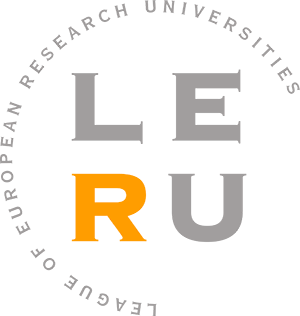
 Focus of the Seminar: Big Data analytics research seeks to exploit data sets (including but not limited to personal data) to establish correlations and trends and to improve decision making. This interdisciplinary seminar will examine Big Data research and innovation practices related to health and will focus on the ethical, legal and social issues. In particular, research integrity issues and privacy aspects will be analysed.
Focus of the Seminar: Big Data analytics research seeks to exploit data sets (including but not limited to personal data) to establish correlations and trends and to improve decision making. This interdisciplinary seminar will examine Big Data research and innovation practices related to health and will focus on the ethical, legal and social issues. In particular, research integrity issues and privacy aspects will be analysed.The Seminar will include presentations, roundtable discussions, case studies and opportunities for networking, exchanging good practice and ideas for developing policy, guidance and training resources.
 This International Seminar is part of a series of seminars held every year at the University of Barcelona to analyse the International Declaration on Bioethics and Human Rights (UNESCO, 2005). In this case, Article 15 – Sharing of benefits and 18 – Decision-making and addressing bioethical issues, will be the framework.
This International Seminar is part of a series of seminars held every year at the University of Barcelona to analyse the International Declaration on Bioethics and Human Rights (UNESCO, 2005). In this case, Article 15 – Sharing of benefits and 18 – Decision-making and addressing bioethical issues, will be the framework.Participation is free, although capacity is limited. Please use the online registration form.
- Registration form: free participation; limited capacity
- Contact: +34 93 403 45 46 / obd.ub@ub.edu
- How to get there
- Press release
AGENDA
Morning
- 9:45 - 10 h. Opening
Dr. Joan Elias, Rector of the University of Barcelona
Dr. Ton Hol, School of Law, Utrecht University, Chair of the LERU Thematic Group Research Integrity (TGRI)
Dr. Xavier Pons, Dean, School of Law, University of Barcelona
Dr. Maria Casado, Director of the Bioethics and Law Observatory - UNESCO Chair in Bioethics at the University of Barcelona - 10 - 11 h. Big Data in health and bioethics
Dr. Sarah Chan, Chancellor's Fellow, Usher Institute of Population Health Sciences and Informatics, University of Edinburgh - 11 - 11.15 h. Break
- 11.30 - 13.30 h. Round table
Moderator: Dr. Itziar de Lecuona, Tenure Track Lecturer and Deputy Director of the Bioethics and Law Observatory and member of the Bioethics Commision at the University of Barcelona, Member of the LERU TGRI
Big Data in human genomics: Challenges and risks
Dr. Marc Via, Tenure Track Lecturer, Department of Clinical Psichology and Psychobiology, University of Barcelona
Privacy preserving data mining
Dr. Carlos Castillo, Head of Data Science Unit, Eurecat Research Center, Catalonia
Food safety in a data-driven & global economy
Mrs. María José Plana, Lawyer, Director of Master in Food Ethics and Law, University of Barcelona
Healthcare data analysis as a return of investment for patient care: Challenges for a university hospital
Dr. Xavier Pastor, Chief Medical Information Officer, Medical Informatics, Hospital Clínic – University of Barcelona
Sharing research data openly and ethically
Dr. Ignasi Labastida, Head of the Research Unit, Learning and Research Resources Centre (CRAI), University of Barcelona
Big Data and precision medicine
Dr. David Torrents, Computational Genomics Group Manager, Barcelona Supercomputing Centre - 13.30 - 15 h. Lunch break and networking
Evening
- 15 - 15.30 h. Big Data guidelines of the Council of Europe
Dr. Alessandro Mantelero, Politecnico di Torino, Nexa Center for Internet and Society - 15.30 - 16.15 h. Research integrity and Big Data at LERU universities and EU Level
LERU’s work in Brussels
Dr. Katrien Maes, Chief Policy Officer, LERU
Work by the Thematic Group Research Integrity (TGRI)
Dr. Ton Hol, School of Law, Utrecht University, Chair of the LERU TGRI
Research integrity and Big Data policies at university level
Dr. Itziar de Lecuona, Tenure Track Lecturer and Deputy Director of the Bioethics and Law Observatory and member of the Bioethics Commision at the University of Barcelona, Member of the LERU TGRI - 16.15 - 17 h. "World café": Roundtable with discussion, conclusions and lessons learned
Moderator: Dr. Francisco Ciruela, Rector's Delegate for Strategic Research Actions and Senior Officer of the UB at the LERU - 17 - 17.15 h. End of meeting
Dr. Domènec Espriu, Vice-Chancellor for Research, University of Barcelona
Dr. Oriol Pujol, Vice-Chancellor for Digital Transformation, University of Barcelona
Photos
-
An interdisciplinary seminar analyzes examples of big data applied to health sciences
 Studying specific cases of how big data are used in the field of science in Catalonia and other countries is one of the objectives of the XI International Seminar on the UNESCO Universal Declaration on Bioethics and Human Rights, to take place on February 16 at the Faculty of Law of the University of Barcelona. Ethical, legal and social aspects of the subject, in particular the parts that are related to scientific integrity and privacy, will be the focus of the seminar, organized by the Bioethics and Law Observatory (OBD)- UNESCO Chair on Bioethics of the UB with the collaboration of the Vice-Rector’s Office for Research of the University of Barcelona.
Studying specific cases of how big data are used in the field of science in Catalonia and other countries is one of the objectives of the XI International Seminar on the UNESCO Universal Declaration on Bioethics and Human Rights, to take place on February 16 at the Faculty of Law of the University of Barcelona. Ethical, legal and social aspects of the subject, in particular the parts that are related to scientific integrity and privacy, will be the focus of the seminar, organized by the Bioethics and Law Observatory (OBD)- UNESCO Chair on Bioethics of the UB with the collaboration of the Vice-Rector’s Office for Research of the University of Barcelona.The opening speech will be given by Sarah Chan, from the Usher Institute of the University of Edinburgh. Expert on scientific research’s ethics, Sarah Chan will show different experiences of big data in health science in Europe. The opening ceremony will be chaired by the Rector of the UB, Joan Elias, with the participation of Ton Hol, member of the thematic group on scientific integrity of the League of European Research Universities (LERU); the Dean of the Faculty of Law, Xavier Pons, and the Director of the Bioethics and Law Observatory (OBD) – UNESCO Chair on Bioethics of the UB and the Master in Bioethics and Law, María Casado.
Afterwards there will be a roundtable to touch on topics such as big data on human genomics and food safety or the challenges in big data at the Clinic Hospital of Barcelona. In the afternoon there will be lectures on the guidelines of the European Council in relation to this subject and several LERU representatives will analyze the subject of scientific integrity and big data.




